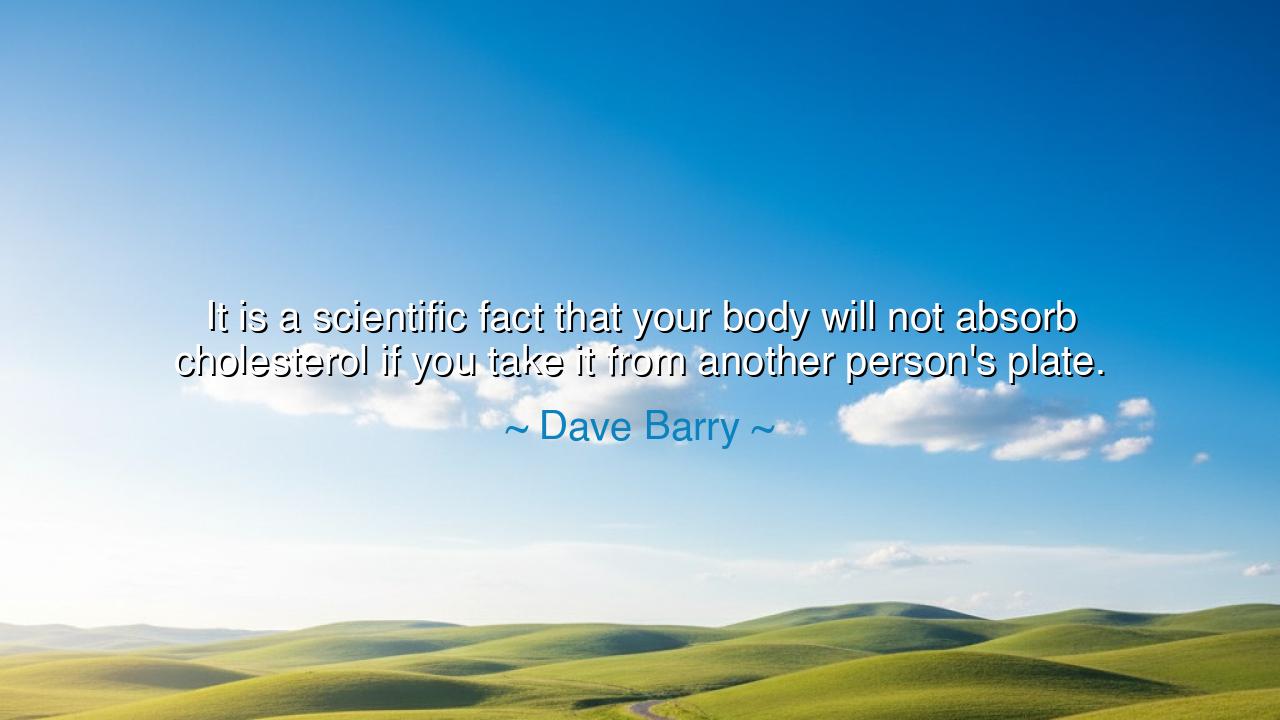
It is a scientific fact that your body will not absorb
It is a scientific fact that your body will not absorb cholesterol if you take it from another person's plate.






When Dave Barry humorously said, “It is a scientific fact that your body will not absorb cholesterol if you take it from another person's plate,” he masterfully used wit to make a pointed commentary about the nature of personal responsibility and the irrationality of certain beliefs. His words are an ironic reflection on how people often seek comfort or justification in superficial or misleading explanations for their behaviors. In this case, the idea of cholesterol absorption — something many might worry about — is reduced to the absurdity of how we sometimes approach our concerns with convenience and a touch of humor. Barry’s statement, though comical, touches on a deeper truth: that in many aspects of life, we try to rationalize our choices by clinging to misconceptions or easy answers, even when they don't hold up to scrutiny.
In the ancient world, humor was often used not just to entertain, but to deliver deeper moral and philosophical lessons. The great Greek playwright Aristophanes often used comedy to mock the absurdities of society and human behavior, exposing truths hidden beneath the veil of laughter. Similarly, Barry uses humor to expose a common human tendency — the tendency to avoid personal responsibility and instead place the burden of change or consequence onto others. His quote serves as a reminder that, just as in Aristophanes’ comedies, rationality and personal accountability are often sacrificed for convenience or comfort.
The origin of Barry’s statement is rooted in his typical style of satirical writing, which often took aim at the human desire for easy answers to complex problems. In the case of cholesterol and diet, many individuals look for quick solutions to their health concerns, frequently relying on myths or simplified truths. The idea that cholesterol can be absorbed from a neighbor’s plate is a stark and humorous example of this tendency. By exaggerating this misunderstanding, Barry shows how we often act out of ignorance or convenience instead of facing the deeper truths of our situation. This concept is universal, not just confined to health concerns, but to the way we approach all aspects of our lives — whether it be work, relationships, or personal growth.
A real-life example of such misunderstanding or misplaced responsibility can be seen in the history of medical advice over the centuries. Consider the case of the ancient Greeks, where Hippocrates famously declared, “Let food be thy medicine and medicine be thy food.” While the wisdom of this statement remains relevant today, much of the medical advice over centuries has been riddled with myths, half-truths, and false beliefs. For centuries, the idea that the body’s health could be improved by removing certain foods or adding others based on superficial knowledge persisted. In the same way, Barry’s joke about cholesterol illustrates that our modern-day concerns over health can sometimes be guided by misconceptions or over-simplified understandings of complex issues, without the deeper knowledge of how things truly work.
The meaning behind Barry's quote is not just an indictment of people’s understanding of cholesterol, but a critique of how we approach life in general. It’s a reminder that real responsibility requires more than just accepting surface-level explanations. When we face challenges, whether it’s about health, relationships, or work, we must dig deeper and seek the truth, rather than accept easy answers that serve our comfort but do not address the root of the problem. Barry’s humorous insight encourages us to question the oversimplified and superficial views we may have about life, and instead pursue a more honest, thoughtful, and responsible path.
The lesson here is a call for reflection and self-awareness. Just as Hippocrates urged a deeper understanding of the connection between food and health, Barry challenges us to understand the true nature of the decisions we make. We cannot outsource our health, our happiness, or our success to false beliefs or easy shortcuts. True responsibility comes from looking within, facing the truth, and making conscious decisions based on real understanding. Barry’s words, though humorous, expose how much of our lives are shaped by these illusions, which distract us from personal accountability and growth.
Practical actions we can take from this wisdom:
-
Seek the deeper truth: When faced with problems, don’t settle for the easy answers. Research and reflect deeply on the situation to uncover the root causes.
-
Avoid surface-level solutions: Resist the temptation to follow simplified or misleading advice without understanding the nuances of the issue.
-
Take responsibility for your choices: Recognize that true growth comes from self-awareness and the willingness to accept accountability for your actions and their consequences.
-
Challenge misconceptions: Whenever you hear a common myth or easy solution, ask yourself if there is more to the story — dig deeper.
For as Dave Barry humorously reminds us, true wisdom comes not from avoiding responsibility but from understanding the complexities of the world around us. The easy answers we seek often mask the deeper truths that we must uncover to live lives that are truly fulfilling and authentic. So, the next time you are faced with a temptation or misconception, remember that while humor can guide us, it’s the truth — honest reflection — that will lead us to growth.






AAdministratorAdministrator
Welcome, honored guests. Please leave a comment, we will respond soon